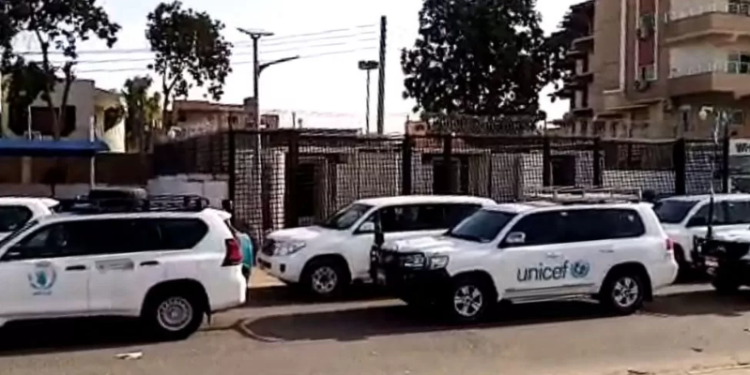As intense violence rages on in Khartoum, several nations have evacuated their nationals and embassies.
On Sunday, the US and the UK declared that they had evacuated diplomats.
Evacuations are being planned in Italy, Belgium, Turkey, Japan, the Netherlands, and Turkey, according to their statements.
According to reports, a French convoy that was attempting to depart the embassy was shot at and had to turn around.
Both the Sudanese regular army and its adversaries, the paramilitary Rapid Support Forces (RSF), claimed responsibility for the assault.
In a statement to the BBC, French authorities declined to comment on whether an attack had occurred, but they did confirm that the operation involved the French military stationed in Djibouti and that its goal was to transport the refugees to Djibouti.
The French foreign ministry announced that it was also evacuating its citizens as well as those of other member states of the EU and allies.
Less than 100 people were flown on Sunday morning, according to US authorities, in a “fast and clean” operation involving Chinook helicopters.
Lt Gen Douglas Sims stated that more than 100 US soldiers from the Army Special Forces and Navy Seals flew from Djibouti to Ethiopia and then into Sudan, being on the ground for less than an hour.
The RSF appears to have decided not to fire on the American helicopters during their operation, despite there being no official ceasefire in place.
According to a tweet on its official account, the US embassy in Khartoum is currently closed since the administration is unable to evacuate individual US citizens due to security concerns.
From an airfield outside of Khartoum, the UK flew diplomats and their families, including several kids, out of the country. The government has urged other UK citizens who are still in Sudan to inform the Foreign Office of their whereabouts, but Foreign Minister James Cleverly warned there were “severely limited” possibilities for their evacuation.
More than 150 individuals were evacuated by boat to the Saudi Arabian port of Jeddah on Saturday, the majority of whom were nationals of Gulf states as well as Egypt, Pakistan, and Canada.
According to reports, internet connectivity in Sudan has virtually disappeared, which might make it extremely difficult to organise aid for individuals besieged in Khartoum and other towns.
The capital city has been heavily bombarded during the power struggle, resulting in hundreds of fatalities and tens of thousands of injuries.
Many foreign students from Africa, Asia, and the Middle East who are also trapped in Khartoum, a city of almost six million people, have made desperate pleas for assistance.
For a large portion of the population, electricity and secure access to food and water have been lost due to the nearly continual shooting and bombing in Khartoum and elsewhere.
A number of apparent bilateral cease-fires were broken, including the three-day period set aside to observe the Muslim festival of Eid al-Fitr, which began on Friday.
According to the World Health Organisation, more than 400 people have died and others have been injured in the violence. However, the number of fatalities is thought to be substantially higher because patients are unable to access medical care because most of the city’s hospitals were forced to close due to fighting.
The western part of Darfur, where the RSF first appeared, has also been severely impacted by the conflict, along with Khartoum.
Up to 20,000 people, largely women and children, have reportedly fled Sudan in search of safety in Chad, which is on the other side of Darfur, according to a UN warning.














































